On September 13, 1964, Martin Luther King, one of the greatest civil rights leaders, visited post-war Berlin, which was already divided by the Berlin Wall. That day, he delivered a sermon in the packed St. Mary’s Church (St. Marienkirche) in East Berlin. Olga Karach spoke at the same church on the anniversary of this event.
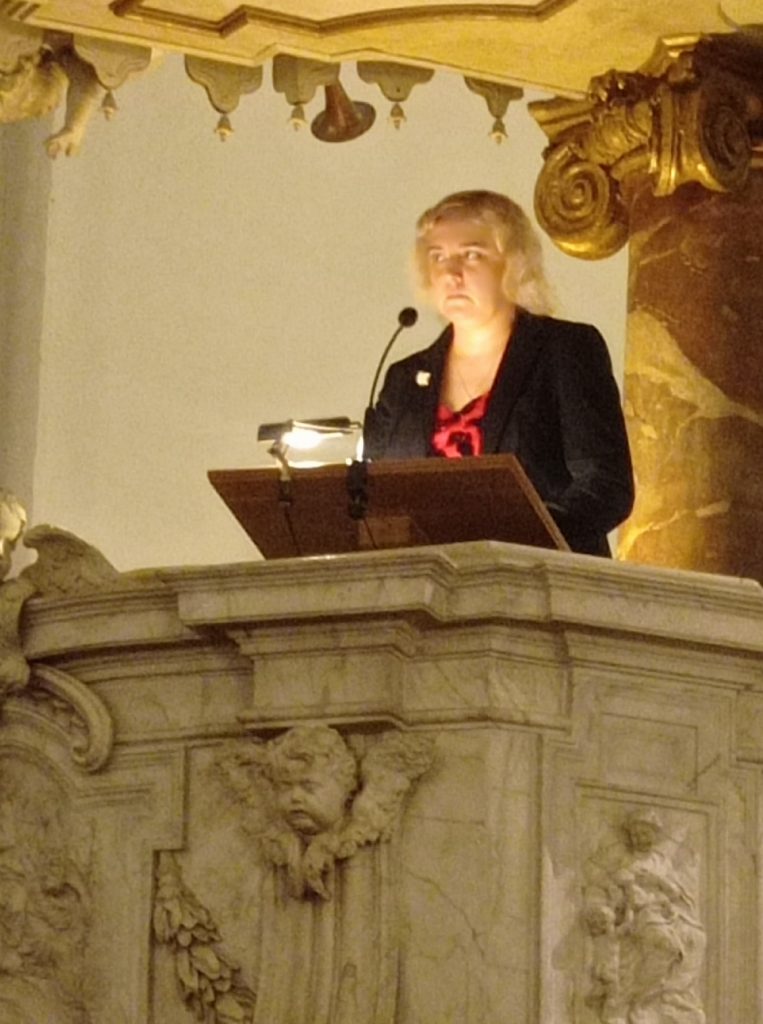
King spoke of peace, love, and nonviolence, despite all the divisions that existed in the world at that time, including the Berlin Wall. This was his only visit beyond the “Iron Curtain,” and his words carried great significance for the people of East Berlin, who were experiencing growing political and ideological isolation. After his address in this church, due to the large number of attendees, he gave another sermon at a different church, the Sophienkirche.
Sixty years later, on September 13, 2024, this historic event was commemorated by human rights advocate and anti-war activist Olga Karach, a 2024 Nobel Peace Prize nominee, who gave a speech in St. Mary’s Church (St. Marienkirche), at the very same place where King once spoke.
Olga Karach is a Belarusian human rights defender and the head of the International Centre for Civil Initiatives “Nash Dom” (Our House). She is known for her active work advocating for human rights and democracy in Belarus. In her speech, Olga Karach highlighted the relevance of Martin Luther King’s legacy for Belarus, spoke about the invisible heroes of the Belarusian resistance, and called for solidarity with Belarus in its struggle for freedom and civil rights.
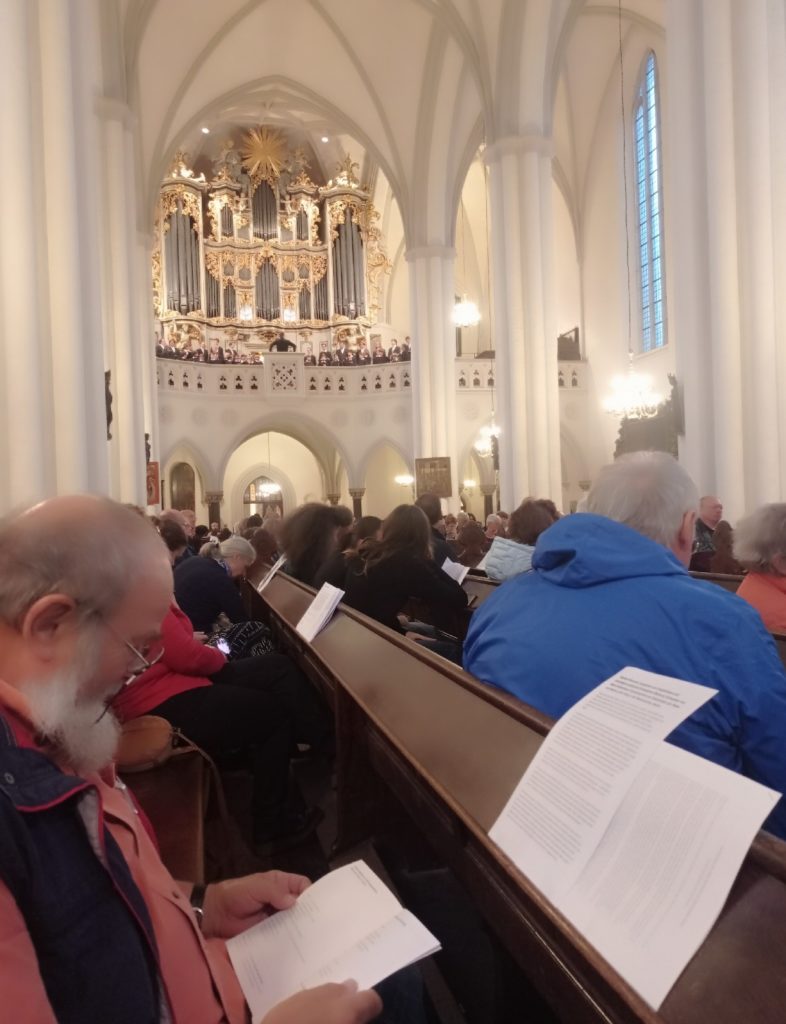
Alongside Olga Karach, Tatyana Khomich, the sister of Belarusian political prisoner Maria Kolesnikova, also spoke, emphasizing the ongoing fight for freedom in Belarus. The presence of the U.S. Ambassador to Germany underscored the importance of continuing the struggle for democratic values and human rights.
Also speaking at St. Mary’s Church (St. Marienkirche) were:
- Bishop Dr. Christian Stäblein – Bishop of the Evangelical Church of Berlin-Brandenburg and Silesia. In his speech, he emphasized Christian values, the promotion of peace, and the need to overcome divisions like those that existed during the time of the Berlin Wall.
- Alan Meltzer – Head of the U.S. diplomatic mission in Germany. His participation underscored the U.S. commitment to the values of democracy and human rights, values once championed by Martin Luther King.
- Rev. Dr. Marsha Williams – A representative of the United Church of Christ from New York. Her speech addressed global efforts to protect human rights and the importance of interfaith dialogue in the modern struggle for justice.
Olga Karach’s speech
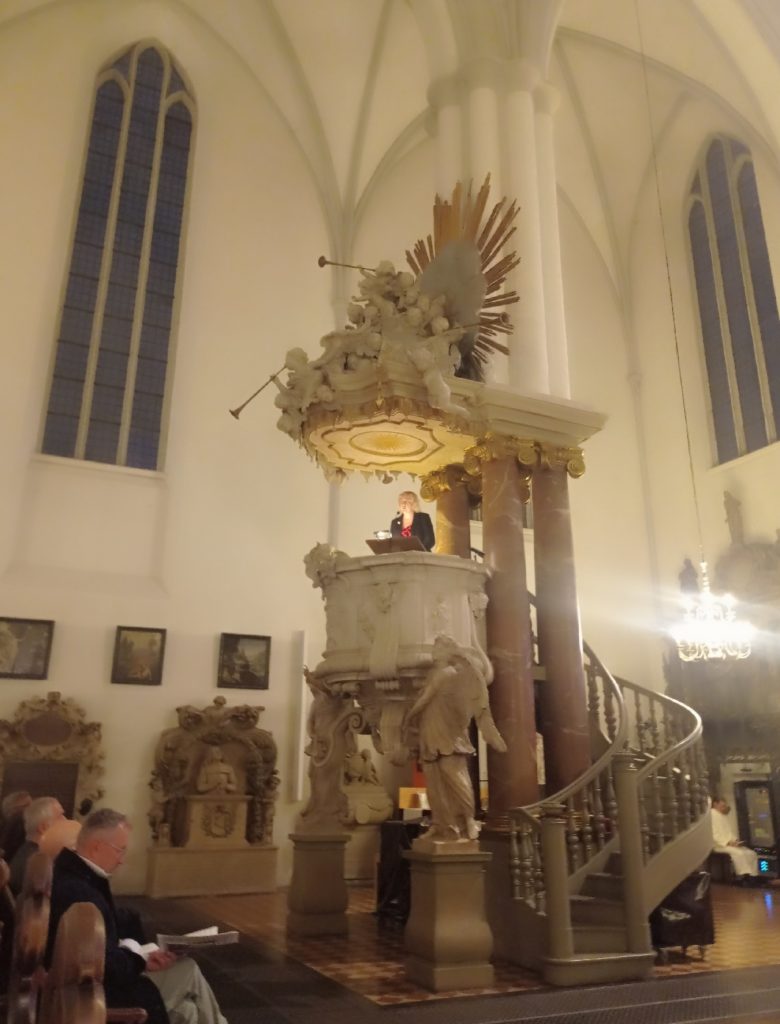
My name is Olga Karach, and I am from Belarus, leading the Belarusian Human Rights Center “Our House”.
In 2024, we find that while history may change its form, it remains profoundly relevant. Belarus, much like East Berlin in those days, is ensnared in a totalitarian regime that seeks to quash the yearning for freedom, truth, and dignity. The barriers dividing us are both physical, like the Berlin Wall, and moral. These barriers run through the hearts and minds of people, separating those who crave freedom from those who serve oppression.
In his speech in Berlin on September 13, 1964, Martin Luther King Jr. said, “No man-made barrier can erase that fact that God’s children live on both sides of the wall. No mere physical barrier can ultimately separate us from each other. The walls cannot hide the essential unity of all mankind.” Martin Luther King Jr. was convinced that, sooner or later, the Berlin Wall would come down, and East and West Germany would reunite. And so it did.
Yet today, Europe is witnessing the rise of a new Berlin Wall, this time on the Lithuanian-Belarusian border, growing taller and longer with each passing day. Belarus has become the new East Berlin, and Lithuania the new West Berlin.
Belarusians are fleeing across the Lithuanian-Belarusian border much like Germans once fled East Berlin: the wall grows and strengthens daily, making escape increasingly difficult, but people are still running. Some traverse forests, finding gaps in the wall, others fashion makeshift parachutes or paraglider to fly over it, while some risk their lives by throwing children and dogs over the barrier, scraping their hands bloody on barbed wire before attempting to climb over themselves, breaking bones in the process. There are Belarusians building catapults to hurl others over the wall. Increasingly, Belarusians are attempting to swim across rivers, sometimes in high-tech suits, other times in ordinary clothing. The water is icy, and winter in Lithuania and Belarus is far harsher than in Germany, so today the Neman River is strewn with backpacks containing documents lost by Belarusian political refugees who attempted to swim across during winter. This is also a concern for the Lithuanian Border Guard.
Since 2020, around 62,000 Belarusians have arrived in Lithuania for various reasons, and let’s be honest – the type of visas or documents they hold is less important than the fact that these people have fled to Lithuania for political reasons, either escaping repression or anticipating it in the future.
But the trials of Belarusian refugees do not end here; they are only beginning. It is incredibly difficult for refugees to maintain contact with relatives who remain in Belarus. The vengeful regime takes relatives of those who have fled and continue to actively resist Lukashenko as hostages, imprisoning them, firing them from their jobs, seizing their children, and using other forms of pressure. Any public statement made by a Belarusian here results in a search in apartments of their relatives there in Belarus.
Relatives in Belarus fear contacting those who have fled due to the threat of the KGB. Also obtaining visas to Lithuania for a mother, wife, sister, etc., if you are a Belarusian political refugee in Lithuania, is nearly impossible; Lithuania does not issue these visas. A new wall is growing between people, and many families are today separated, unable to see or embrace each other for years. People are dying, and there is no chance to say goodbye or bury them. Some individuals cannot bear it and risk traveling to Belarus for a relative’s funeral, only to be arrested at the border.
I have not spoken with my relatives for four years and learn about their lives only through distant acquaintances. They hear about me from state propaganda broadcasts that constantly paint me as a villain. Over the past four years, the Belarusian regime has produced over 200 propaganda broadcasts attempting to tarnish my reputation among Belarusians.
Today, in Belarus, heroism means trusting your heart rather than the massive daily machinery of state propaganda. My family and I have a deep love and warm relationship, but even talking to me can lead to immediate imprisonment by the KGB. They fear imprisonment and torture, and I do not want to put them at risk. Despite all modern communication methods, an invisible wall grows between us every day. They know nothing about me, and I know nothing about them.
In Belarus today, steadfastness means forgoing communication with loved ones to protect them and choosing between relatives and a fight for human rights and freedom. People are arrested and imprisoned solely for their contacts with “Our House,” for comments on our social media, and for attempting to reach out to us. From the cases we know, people have received approximately 80 years of Belarusian prison time for comments on “Our House” social media. The actual number imprisoned is likely much higher.
Despite these risks, people in Belarus continue to write to us, help us, and participate in “Our House” activities. Our work continues undeterred. The regime has tried hard to build a wall between us and the Belarusian people, but it has not succeeded. Today, in Belarus, bravery is refusing to let a wall be built between you and those you care about and support.
On January 5th (my birthday), 2021, political prisoner Dmitry Dudoyt took his own life in a Belarusian prison, unable to endure the cruel torture. Dmitry’s only crime was posting a comment on my page on “Odnoklassniki.” For this, he was sentenced to two years in prison. You can imagine how I feel right now.
Suicides are often committed out of desperation and lack of hope, but in Belarus, under inhumane torture that can drive one to madness, sometimes it is the only way to preserve one’s dignity and declare one’s unyielding spirit.
My colleague, lawyer, and human rights defender with “Our House,” Yana Polyakova, took her own life, unable to endure police violence and harassment. Yana had been brutally beaten at a police station, and when she spoke out about it publicly, they attempted to imprison her. Yana declared that the regime would not make her a prisoner and took her life just hours before she was due to be sent to jail.
In Belarus, suicide is often the only way to demonstrate to the regime that one has a choice and free will, even when the regime believes it can force everyone to comply with its demands.
Igor Lednik, a member of the Social Democratic Party, my colleague, and human rights defender, died in a Belarusian prison from torture, four days after Alexei Navalny’s death in a Russian prison under similar circumstances. Igor dedicated his life to holding the Belarusian regime accountable, gathering evidence of torture and mistreatment, and aiding victims of political repression. He could have fled; I personally urged him multiple times to escape to Lithuania. Igor said, “Olga, if I am arrested, make sure my arrest exposes to the world the horrific human rights situation in Belarus.” Igor died in a Belarusian prison on February 20, 2024, but I think of him every day and continue the work he did.
In Belarus, courage means living and acting according to one’s convictions, even knowing that arrest, torture, or death may follow. And not stepping back a single inch.
My colleague, a mother of two and human rights defender with “Our House,” Kristina Shatikova, was abducted in Minsk in the middle of the street by KGB agents. For three days, we searched for Kristina while her young children cried out for their mother. We eventually found her; the KGB had forcibly taken Kristina to a psychiatric hospital in Mogilev and administered psychotropic drugs to her. Kristina’s bright red hair saved her; a passerby recognized her and noted down the car’s number as she was dragged away by the KGB.
Today, punitive psychiatry is one method used to deal with dissenters or to eliminate witnesses to the regime’s crimes. Maria Uspenskaya is currently sentenced to a forced psychiatric hospital. She witnessed the KGB agent who shot her husband, Andrei Zeltser, in their own apartment. Maria has been in a Belarusian psychiatric hospital for three years, and there have been no updates about her.
In Belarus, resilience means refusing to betray, not becoming a false witness, and not retracting one’s testimony under KGB pressure, even knowing that imprisonment or psychiatric detention awaits.
My son was just one month old when KGB and social services agents tried to take him away from me, threatening that my son will be removed from our family to an orphanage unless I abandoned my human rights work. I vividly remember the sense of despair and utter helplessness. I had to run with my son from Belarus because I had no illusions about the regime’s intention to take him and damage his psyche merely to exact revenge on me.
As a result of the 2020 protests, more than 1,200 children are now at risk of being taken from their families or have already been removed due to their parents’ protest activities.
Fighting for human rights in Belarus often means that your children will be deprived of their homeland or taken away from their family.
My colleague and human rights defender from “Our House”, Valery Shchukin, was abducted by police on the day he was supposed to be released from prison and taken to the forest to simulate a shooting. They gave him a shovel and told him to dig his own grave before they would execute him. He refused, and they left him alone in the forest. Later he told me how terrified he was, knowing they could actually kill him, and no one would know because officially it was said he had supposedly left the prison on his own.
It’s easy to be a hero when hundreds of thousands of people are watching you, when people know about you and worry about you. It’s very hard to be an invisible hero when it’s just you and them, who can do anything they want with you.
In such situations, only faith in God and the strength that God gives us to overcome all obstacles can save us. That’s why the Belarusian regime fights so desperately against God.
To date, it is known that Belarusian priests and church members have been sentenced to a total of minimum 97.5 years in prison for prayers, religious ceremonies, and public support for Ukraine. The Belarusian KGB has created a list of unreliable clergies from various confessions, which is periodically updated. It is known that there are at least a hundred names of “unreliable” priests on this list.
In Belarusian prisons, priests are massively denied access as a method of pressure on prisoners, whether they are Orthodox, Catholic, or Protestant. In pre-trial detention centers and prisons, the administration does not allow the transfer of prayer books, Bibles, and other religious literature, including the New Testament. Security forces often cut off or even tear off religious ornaments and Christian crosses from the necks of detainees. Furthermore, political prisoners are not allowed to participate in farewell ceremonies (funerals) for their deceased close relatives. This is a special form of torture—to prevent one from saying goodbye to loved ones.
The Belarusian regime persecutes Belarusian believers even for praying for those killed in Ukraine. For example, on September 9, 2022, in Bobruisk, a believer named Vyacheslav Bukas was found and arrested based on fingerprints taken from the lamps he had lit at a monument to repressed people. The lamps were blue and yellow, which the court interpreted as symbols of the Ukrainian flag and support for those killed in Ukraine. This “serious” crime was thoroughly investigated, and a whole forensic team was involved. Vyacheslav Bukas was sentenced to 15 days, as the court believed his lamps were part of an unauthorized mass event.
It is very difficult not to fall into despair, not to become bitter, and not to break. But Martin Luther King taught us that “Darkness cannot drive out darkness; only light can do that. Hate cannot drive out hate; only love can do that.”
We do not give up; love for our neighbors and God is what drives us and gives us strength to fight.
In Belarus, sending packages to prisons is prohibited unless you are a relative. Therefore, when packages are sent to prisons, often by women, we always say that they are from a sister. It is very difficult to verify if you are a sister or not. Although very often, we have never seen our “sisters” in person or met them in our lives.
In the elections-2010, my colleagues and human rights defenders from “Our House”, Maria Voinova and Kristina Shatikova, were arrested and severely beaten in a police station. I arrived at the police station and, after a lot of persuasion, managed to convince an officer to pass a chocolate bar to them. When I was asked, “How should I say it’s from?” I quietly answered, “Say it’s from a sister.”
Four months later, I was arrested too. The Belarusian regime charged me with terrorism because terrorism in Belarus carries the death penalty, and it was an easy way to get rid of “Our House”. Along with me, 18 activists from “Our House” were detained. I was severely beaten in the police station and was told in detail how I would be raped.
I was stunned, shocked, and frightened. I sat in the cell, unable to recover from the pain and humiliation. But suddenly, the cell doors opened, and an officer silently handed me a package. “What is this?” I asked suspiciously. “It’s from a sister,” the officer replied.
I took the chocolate, and my heart warmed. I met my “sister” only the next day. Of course, I had never known her before. But I still remember the strength and power my “sister” sent me through that chocolate bar.
In 2020, “Our House” organized packages for prisons, paid fines, and helped the families of political prisoners. The activists of “Our House” sent chocolate bars to prisons “from sisters.” We were nicknamed “owls” because arrests in Belarus usually occur at night, and the activists of “Our House” had to stay awake on the Hot Line to immediately respond to calls for help.
The Belarusian regime noticed our sisterhood and our assistance. For sending packages to political prisoners, helping with fines, and supporting people under repression, I received a 12-year prison sentence in Belarus. I was sentenced along with Veronika Tsepkalo, one of the three women of the Belarusian revolution.
Today, I speak here with the voice of my sisters in prison, to whom I sent chocolate, and with the voice of my sisters who sent chocolate to me and other imprisoned women. The chocolate solidarity continues, and we pass chocolates to each other as a symbol of our boundless solidarity that will never end.
My colleague and human rights defender from “Our House”, Yulia, was also arrested for sending packages to political prisoners. She spent 8 months in a Belarusian prison under torture. But the worst thing was not this. The worst thing was that in her criminal case, she found denunciations to the KGB about herself from her father and brother. Her brother lived with her; she waited for him to come home from work, cooked breakfast for him, and he helped us with our support for political prisoners, but at the same time, he reported everything to the KGB. When Yulia was released and asked her brother why he reported her to the KGB, he confessed that he and their father hoped Yulia would be sentenced to 20 years, and her apartment would be freed up for him to live in.
Another colleague of mine, a mother of two children and an activist from “Our House”, Ilona, had to flee across the border illegally because her mother reported her opposition activities to the KGB, and the KGB came to threaten Ilona’s children. Just imagine, a grandmother reported her granddaughter’s activities to the KGB, which could have led to her grandchildren being placed in an orphanage. Ilona fled across the border illegally and is now in Lithuania with her children, and since then, Ilona has never spoken to her mother, so great is her resentment towards her.
Today, in Belarus, people are massively reporting each other to the KGB. Mothers and fathers report their children to the KGB, children report their parents, and siblings report each other. The nation is deeply divided. I often think about how our path to reconciliation within the nation will be very difficult. How can one forgive a relative whose report to the KGB led to another relative being imprisoned, tortured, or even possibly killed? How can reconciliation be achieved in such a situation, and is reconciliation even possible? I do not have an answer to this question. But sometimes I think that for Yulia’s mental health, it would have been easier if her brother had died as a hero on the front lines defending Ukraine, rather than knowing she was imprisoned because of his denunciation to KGB.
But the Belarusian regime does not confine itself to Belarus; it reaches out to us, those in exile. Even in Lithuania, I do not feel safe; the KGB spies on us here too.
When the war began, we realized that our only way to help Ukraine was to prevent the Belarusian army from going to Ukraine to support Vladimir Putin. We began to assist conscientious objectors and deserters. Since March 1, 2022, we have been running the “No Means No” campaign. Naturally, the regime noticed it immediately.
In Vilnius, we enlisted Lithuanian lawyer Mantas Danielis to help us with the legalization of conscientious objectors and deserters. A few months later, Mantas Danielis was detained by Lithuanian police; to this day, he has been in prison for two years, officially charged with espionage for the KGB. That is, the Belarusian KGB recruited a Lithuanian lawyer to spy on us, defenseless Belarusian women in Lithuania. Mantas Danielis faces up to 11 years in Lithuanian prison for espionage on behalf of the KGB.
Today, I am again labeled as a terrorist in Belarus, and if the Belarusian regime manages to return me to Belarus, I will face not just 12 years in prison but up to 25 years or even the death penalty, as, as I mentioned earlier, terrorism in Belarus carries the death penalty.
Today the human rights center “Our House” has been labeled as an extremist organisation 18 times in Belarus, and any volunteer, activist or human rights defender of “Our House” risks 7 years in prison in Belarus for supporting extremism. But people take the risk and participate at anyway.
But we do not give up and we do not retreat. Martin Luther King said, “The arc of the moral universe is long, but it bends toward justice.” And I believe in that too, that good will ultimately triumph over evil.
Today, we all need a new security architecture in our region. We need to rethink the concept of peace, because, for example, in Belarus today, there is neither war nor peace.
We need to look at the situation in the region as a whole and reflect, study, and analyze how we can influence the war and terror today.
Today, more than ever, we need to support Belarusian and Russian conscientious objectors—men who refuse to take up arms and support Vladimir Putin in his war against Ukraine. This is the simplest thing we can do—to help our men avoid fighting in this war. This means fewer Ukrainian casualties and a quicker end to the war. Because even with the most modern technology, Putin and Lukashenko cannot fight if they don’t have soldiers. Let’s work together to ensure they don’t have soldiers.
Today, more than ever, we must not retreat from our values and beliefs, because that is exactly what the Kremlin wants—to impose its Putin-style life on us, with disrespect for individuals, human rights, and freedom.
Today, we have a group of volunteers who are helping the pets of repressed people to relocate. People are fleeing at the last moment, and they can’t take their pets with them. However, hamsters, cats, and dogs are members of the family, and even after fleeing, people don’t forget about them. They make enormous efforts to relocate their cats and dogs to Lithuania to be reunited with them. For me, this rescue of pets—these hamsters, cats and dogs who have lost their homes and owners due to the repression of the Belarusian regime—is a profound lesson in humanity that Belarus is teaching all of us today.
We all need to learn the lessons of nonviolent resistance taught by Martin Luther King and the unnamed heroes of Belarusian resistance. Martin Luther King said, “Injustice anywhere is a threat to justice everywhere.” And it is true because justice cannot be partial; it is either for everyone or for no one.
The freedom of one nation cannot be complete until all nations are free.
Martin Luther King believed in the power of nonviolent resistance and in the possibility of changing the world through love, understanding, and unity. Despite all the pressure, I believe and see the power of nonviolent resistance in Belarus, which cannot be crushed by any amount of terror.
Martin Luther King is also attributed with the words: “We must accept finite disappointment, but never lose infinite hope,” which today serve as a call for us not to despair but to continue the struggle for freedom, truth, and justice.
We know that change is possible. The history of Berlin proves that. We believe that the day will come when Belarus will also be free. And on that day, we will remember King’s words with even greater depth and gratitude.
In that distant 1964, Martin Luther King, in his famous speech in West Berlin, said: “Freedom is never voluntarily given by the oppressor; it must be demanded by the oppressed.” These words then deeply resonated in the hearts of people on both sides of the Berlin Wall. Today, these words deeply resonate in the hearts of the Belarusian people, who are fighting for freedom, truth, and justice despite countless victims and terror.
And I believe that the day will come when we will celebrate the 10th, 20th, 30th, 60th anniversary of the fall of the Belarusian dictatorship, as we now celebrate the fall of the Berlin Wall.
That day will come, and we will bring it closer.





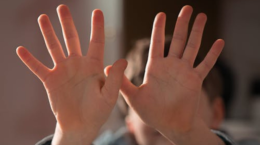


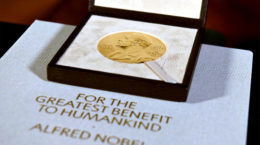


Dear Olga, dear sisters and brotherS from Our House… I deeply thank you for your work, commitment and dedication to oeace and Human rights defence. The whole world is our House and it is burning… Everywhere in Europ now, Middle east, west Africa and Great Lacs region where my country Rwanda is located. From my experience as Post Genocide Peace and human rights defender, I can only say : don’t give up, do not tolerate the status quo rather continue to dream the better world and keep Moving whatever happens… Every single effort counts and together day by day, step by step the situation will be better and your dreams will come true. Peace